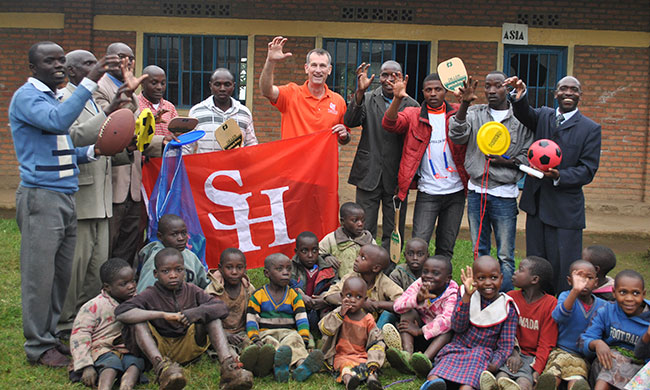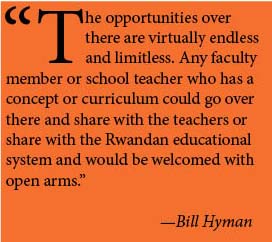Health, Kinesiology Professor Brings Equipment, Knowledge To Rwanda
March 21, 2014
SHSU Media Contact: Jennifer Gauntt
Story By: Linda Gilchriest
 |
| Health and kinesiology professor Bill Hyman (center) brought sporting equipment to educators in Rwanda who also received assistance with physical education curriculum instruction. This was Hyman's third trip to Africa. —All photos submitted |
Conflict, death and famine are among the most common issues Americans associate with countries in Africa.
But while those may be among the most pressing issues faced by the African populations, they are far from the only issues its inhabitants face.
Bill Hyman, graduate coordinator for health education at Sam Houston State University and professor in the health and kinesiology department, has spent several years working with educators in three countries on another growing issue—that of physical education.
Over the holiday break, Hyman travelled to Rwanda to assist teachers with physical education instruction.
That African countries need help with physical education may run counter to commonly held beliefs by Americans about the people who live in those countries, but Hyman had previously travelled to Zambia and Uganda to assist in similar programs.
“Most Rwandans walk everywhere they go and due to poverty and limited food supply, there is little overeating; thus, overweight and obesity does not appear to be a major health problem,” Hyman said. “However, by providing opportunity for organized physical activity and skill development, it broadens the amount, type and level of activities they can participate in.
“Without this, as the country develops and becomes more urban, physical activity will likely decline and the same chronic health problems associated with inactivity that plague developed countries will emerge there as well,” he said. “They need to be physically educated just like anyone else.”
 Hyman was first made aware of these types of issues when he was invited to go to Uganda in January 2013. The team that was travelling there believed that Hyman’s academic work in health and kinesiology would benefit some of the “perceived” needs in Uganda.
Hyman was first made aware of these types of issues when he was invited to go to Uganda in January 2013. The team that was travelling there believed that Hyman’s academic work in health and kinesiology would benefit some of the “perceived” needs in Uganda.
During that trip, Hyman came to understand the extent of the issue.
“I came back a little overwhelmed; with so much need, I really didn’t know where to start,” he said. “Because of that, I really kind of put (a return trip) on the back burner—until last summer.”
When it came time to begin planning that return trip, Bill Edgington and James Hynes, both in the SHSU College of Education, tipped Hyman off to a program from the Canadian Teacher Federation, a national alliance of professional teacher organizations, that put together some basic physical education instructional activities that they had shared with teachers in Uganda.
“Activities included large group games, games that are intended to keep kids up and on their feet and active over a certain period of time,” Hyman said. “It is really like some of the things we teach. I think theirs were more geared toward elementary physical education. It just kind of spurred the idea, ‘Hey, that’s something I have an interest in. I like doing that and I have done that before.’”
About that same time, a missionary group out of College State invited Hyman to go to Rwanda.
“One27 Ministries works with churches, schools and communities. They provide scholarships to a lot of kids,” Hyman said. “Their philosophy is if they are going to pay for kids to go to school, they would like to help the teachers become good teachers at the schools where the kids attend.”
Hyman was the only instructor from SHSU to make the trip.
He said he put together an abbreviated curriculum based on the Coordinated Approach To Child Health, or CATCH, a national school-based health program designed to promote physical activity and healthy food choices. Although he didn’t get a chance to develop a health component this trip, he hopes to expand the program to include it in future trips.
He said he found the Rwandan education system interesting.
“I’m not sure I have a full understanding of the American education system and how it is supposed to work, so trying to figure out the Ugandan and Rwandan educational systems work was a bit of a challenge,” he said.
Rwandan schools have a first-through-sixth-grade primary school and a six-year secondary school.
“When you complete primary school, you take a national certification exam and until you pass that exam, you do not get to go to secondary school,” Hyman said. “Then, they have an exam after the ninth grade that you have to pass before you can continue your secondary education. And when you graduate, there is a national certification exam.
Fun, Fitness... |
“One of the things that was interesting to me was one of the qualifications to be a primary school teacher is simply that you had completed the 12th grade,” he said. “These teachers have, basically, a high-school education. Most of them have no teacher training, whatsoever, if they are teaching in an elementary school. Some of them had attended a year, maybe two years of a teacher’s college, but many of them have not.”
Once Hyman created his study guide, he contacted S & S Worldwide, an athletic supplier in Colchester, Conn., where he hoped he could negotiate an equipment discount for the supplies he would take to Rwanda.
“They did a lot better than that; they made a significant donation of equipment for me to take to Rwanda,” Hyman said.
“I took a lot of playground balls, soccer balls, jump ropes, flying discs that we would typically call Frisbees, bean bags and some paddles and paddle balls,” he said. “The schools had very little equipment, if anything. They may have had an old, tattered soccer ball in the corner that may not even hold air.
“I was able to do the workshops using the equipment, donate the equipment and leave it with them. Of course, that thrilled them to no end,” he said.
The One27 Ministries teams were based in Kigali, Rwanda’s capital. Hyman said he didn’t have much time for instruction since the schools were located in remote villages, miles away, over rough terrain that made the trip difficult and long. But the African teachers were receptive to his instruction.
Hyman was in Rwanda during the Christmas holiday break, but at one school, all 11 teachers showed up for his workshop and at the second school, seven of eight attended.
“I’m not sure you could get that kind of turnout here in the United States over Christmas break,” Hyman said.
The students were not in class, but they turned out to watch and participate in the new field sports.
He was able to spend a couple of hours with teachers in each place. He took elements of the curriculum taught at SHSU, scaled it down and modified it to what he thought teachers would be receptive to.
“The thing that went over at most schools overwhelmingly was the jump ropes,” Hyman said. “They loved the jump ropes and, fortunately, I had probably developed the jump rope curriculum more than I had developed the others.”
When you jump rope, you are learning aerobic activity, rhythmic activity, and eye/hand coordination.
“You can build some degree of muscular endurance in the lower body. So you are teaching them not only some performance skills, but a great calorie-burning activity,” Hyman said.
The Rwandan teachers told him when he comes back, they what to develop progression lessons. For instance, if they did a jump rope lesson for first graders, how do they build upon that for second, third, and the remaining primary school classes?
“If and when I go back, I will incorporate some of that,” he said.
Not only would he like to go back, he encourages all teachers to do a volunteer stint in Africa.
“The opportunities over there are virtually endless and limitless,” Hyman said. “Any faculty member or school teacher who has a concept or curriculum could go over there and share with the teachers or share with the Rwandan educational system and would be welcomed with open arms.”
- END -
This page maintained by SHSU's Communications Office
Associate Director: Julia May
Manager: Jennifer Gauntt
Located in the 115 Administration Building
Telephone: 936.294.1836; Fax: 936.294.1834
Please send comments, corrections, news tips to Today@Sam.edu.

 SamWeb
SamWeb My Sam
My Sam E-mail
E-mail

